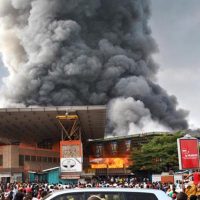The Second Vice President, Joseph Butore, alongside other high level government officials carried out a field visit along the shores of Lake Tanganyika to notice the current situation on the pollution of Lake Tanganyika and its biodiversity. He said there is a lack of determination and will to protect Lake Tanganyika

Lake Tanganyika is mainly threatened by industrial wastes…
Following different reports and warnings about the pollution of Lake Tanganyika, the Second Vice President and Ministers of Environment, Health, Home Affairs, Energy and Mines have visited the shores of Lake Tanganyika notice the present situation on the pollution of the lake. “It is hard to describe the situation on the shores of Lake Tanganyika as a decision-maker”, says Butore.
He says it is time to impose serious measures to protect Lake Tanganyika, its biodiversity and surroundings. Wastes, wastewaters, insecticides from different corners of the capital Bujumbura, uncontrolled constructions are the main causes of pollution of Lake Tanganyika. Offensive odor comes out of the shores of the Lake.
Joseph Butore says all state institutions and environment reforms are available to react efficiently. “Maybe, there is a lack of will and determination to fully protect Lake Tanganyika”, says Butore.
Jeroboam Nzikobanyanka, Director General of the Burundian Company in charge of Supplying Water and Electricity (REGIDESO) says Lake Tanganyika is the main reservoir for the company. Regideso takes over 88,000 cubic meters per day and more than 90% of the water supplied to the capital of Bujumbura are from the lake.
He says that if nothing is done immediately to fight against the pollution of Lake Tanganyika, Bujumbura residents will face drinking water related problems. “Pipes used for the abstraction of drinking water are nowadays located at 3,5 km against 800 meters used in 1969,” says Nzikobanyanka.
“Local administration must punish lawbreakers”
Tharcisse Ndayizeye, an environmental activist, also a member of the National Observatory of Water and Sanitation says industrial wastes, oil works, butchery and household wastes are the main causes of pollution of Lake Tanganyika. “Many of them are not connected to the Buterere sewerage plant for treatment before going into the Lake. They then end up directly to the lake”, says Ndayizeye.
Meanwhile, the Buterere sewerage plant has broken down since the past three years. The environmental activist also says the pollution of Lake Tanganyika contributed to the reduction of fish production by 25% in 2011.
Ndayizeye says people at all levels must be involved in the protection of the lake. “The local administration must punish recalcitrant people according to the law”, he says.
Lake Tanganyika is the second largest freshwater lake in terms of volume and, with a depth of 1,470 meters; it is the second deepest lake in the world. At 673 kilometers long, it is the longest lake in the world. It also became the “most threatened lake” in 2017, according to the Global Nature Fund (GNF). Sedimentation, pollution and overexploitation jeopardize the second largest lake in Africa.



















 IWACU Open Data
IWACU Open Data

